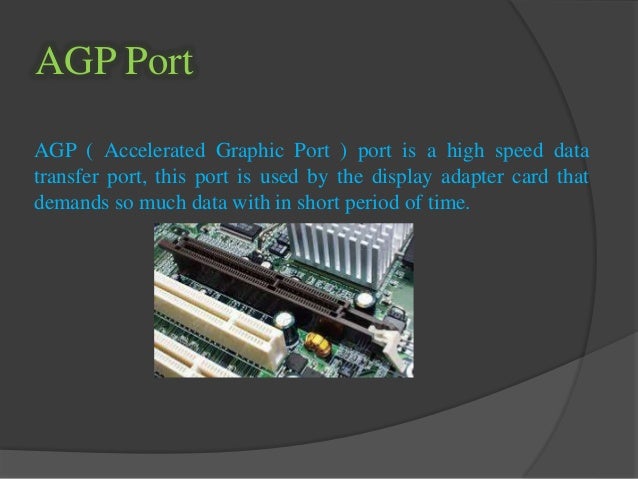Function Of A Expansion Slots
Alternatively known as a bus slot or expansion port, an expansion slot is a connection or port inside a computer on the motherboard or riser card. It provides an installation point for a hardware expansion card to be connected. For example, if you wanted to install a new video card in the computer, you'd purchase a video expansion card and install that card into the compatible expansion slot.
Which of the following best describes the purpose of expansion slots in modern computers? Expansion slots allow additional cards to be connected to the motherboard that interface with peripheral devices. Power connectors are responsible for which of the following? Taking current from external wall outlets.
Computer expansion slots
The expansion slots on a motherboard provide us with almost unlimited options for customizing our computers. In this video, you’ll learn about the PCI bus, the PCI Express bus, and riser cards. You can extend the functionality of a motherboard by adding adapter cards. An expansion slot refers to any of the slots on a motherboard that can hold an expansion card to expand the computer's functionality, like a video card, network card, or sound card. The expansion card is plugged directly into the expansion port so that the motherboard has direct access to the hardware.
Below is a listing of expansion slots commonly found in a computer and the devices associated with those slots. Clicking on any of the links below provide you with additional details.
- AGP - Video card.
- AMR - Modem, sound card.
- CNR - Modem, network card, sound card.
- EISA - SCSI, network card, video card.
- ISA - Network card, sound card, video card.
- PCI - Network card, SCSI, sound card, video card.
- PCI Express - Video card, modem, sound card, network card.
- VESA - Video card.
Function Of A Expansion Slots Jackpot
Many of the above expansion card slots are obsolete. You're most likely only going to encounter AGP, PCI, and PCI Express when working with computers today. In the picture below is an example of what expansion slots may look like on a motherboard. In this picture, there are three different types of expansion slots: PCI Express, PCI, and AGP.
How many expansion slots does my computer have?

Every computer motherboard is different, to determine how many expansion slots are on your computer motherboard identify the manufacturer and model of the motherboard. Once you've identified the model of motherboard, you can find complete information about the motherboard in its manual.

Adding additional expansion slots for older motherboards could be accomplished by using a riser board, which would add several ISA or PCI slots. Today, riser boards are rarely used with motherboards, as there is limited need for additional expansion slots with modern motherboards.
What type of expansion slots are on my motherboard?
As mentioned above, every motherboard model is unique, so to determine the type of expansion slots on the motherboard, consult the board's specifications and owner's manual. You can also open the computer case and visually examine the motherboard.
Why do computers have expansion slots?
Computers have expansion slots to give the user the ability to add new devices to their computer. For example, a computer gamer may upgrade their video card to get better performance in their games. An expansion slot allows them to remove the old video card and add a new video card without replacing the motherboard.
What is the most common expansion slot today?
Function Of A Expansion Slots Machine
Today, the most commonly used expansion slot used and found on computer motherboards is the PCI Express expansion slot.
Function Of A Expansion Slots Free Play
Does a laptop have an expansion slot?
Laptops do not have expansion slots like a desktop computer. However, some laptops do have PC Cards that can be inserted into the side of the laptop. They may also have a Cardbus slot for an ExpressCard to be added.
Related expansion slot pages
Function Of A Expansion Slots Machines
Expansion, Expansion card, Motherboard terms, Seated